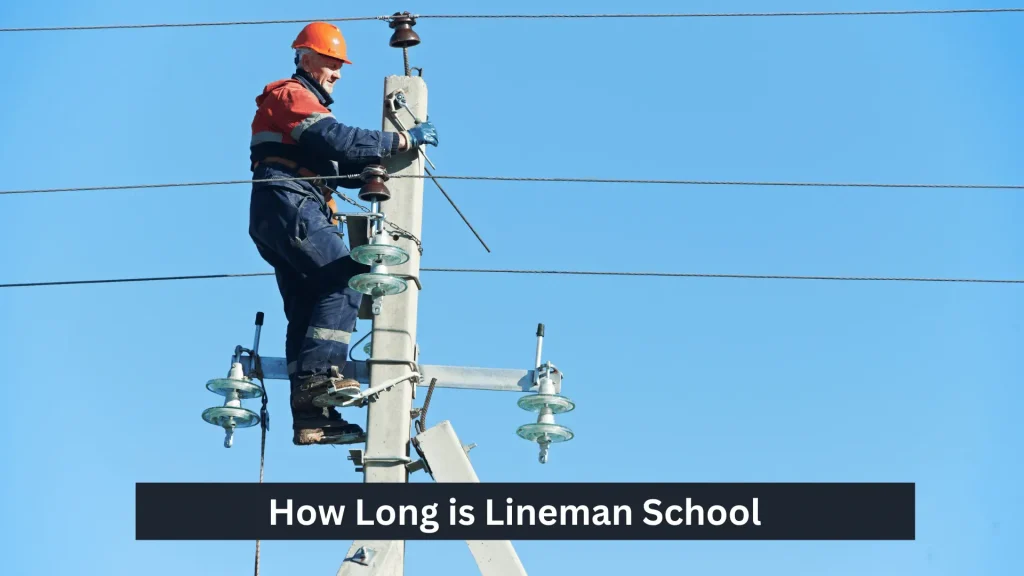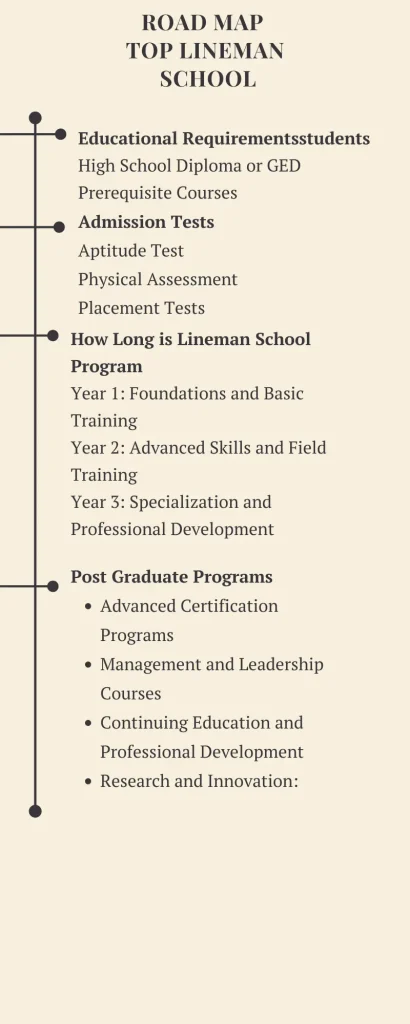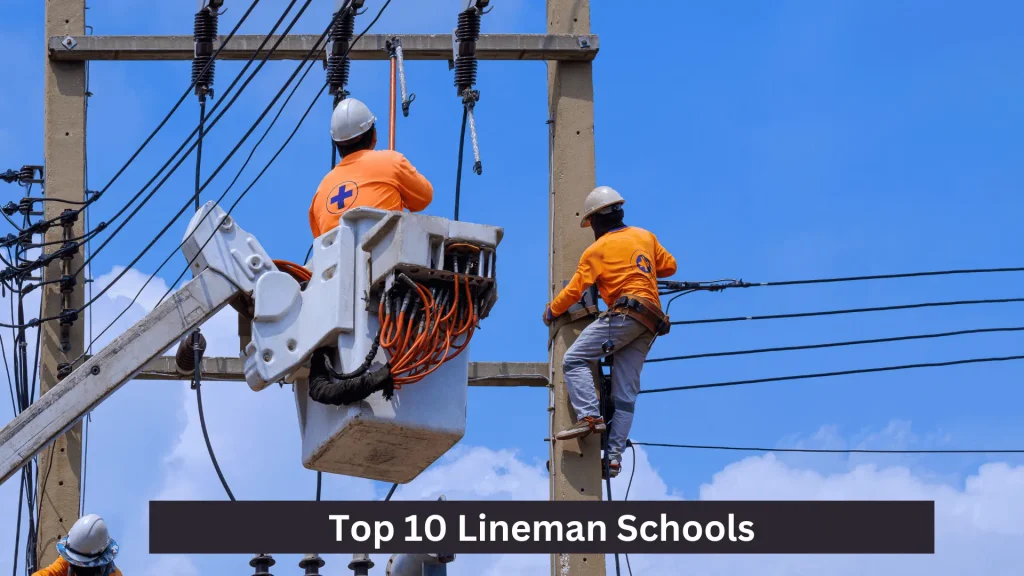Lineman school typically lasts between 6 months to 2 years, depending on the program and institution. The duration can vary based on factors such as the depth of training, certifications offered, and hands-on experience. Prospective students often ask, “How Long is Lineman School?” to plan their educational and career timelines accordingly.
What is Lineman School
Lineman school is an educational program designed to train individuals to become electrical linemen. These schools offer specialized courses that cover the technical knowledge and practical skills needed to install, repair, and maintain electrical power systems. Students learn about safety protocols, climbing techniques, and equipment handling to ensure they are well-prepared for the demands of the job.

In addition to classroom instruction, lineman schools provide hands-on training in controlled environments. This practical experience is crucial for developing the competencies required to work in the field. Graduates of lineman school are equipped to pursue careers with utility companies, telecommunications firms, and other industries that rely on electrical infrastructure.
How Long is Lineman School
Year 1: Foundations and Basic Training
Introduction to Electrical Theory: Students learn the basic principles of electricity, including voltage, current, resistance, and power.
Safety Protocols: Emphasis on safety practices and procedures to prevent accidents and injuries.
Basic Climbing Techniques: Initial training in climbing poles and towers, including proper use of safety gear.
Tools and Equipment: Introduction to the tools and equipment used in the field, such as pliers, wrenches, and testing devices.
First Aid and CPR: Basic first aid and CPR training to handle emergencies on the job.
Year 2: Advanced Skills and Field Training
Advanced Electrical Systems: In-depth study of complex electrical systems, including transformers, substations, and circuit breakers.
Line Construction: Training in the construction and maintenance of electrical lines, including overhead and underground systems.
Field Practicum: Hands-on experience in real-world settings under the supervision of experienced linemen.
Troubleshooting and Repairs: Techniques for diagnosing and repairing electrical faults and failures.
Certifications: Preparation for industry certifications, such as OSHA safety certification and CDL (Commercial Driver’s License) for operating heavy equipment.
Year 3: Specialization and Professional Development
Specialized Training: Focus on specialized areas such as high-voltage systems, fiber optics, or telecommunications lines.
Project Management: Training in project planning, management, and coordination for larger electrical projects.
Regulatory Compliance: Understanding of industry regulations, environmental considerations, and compliance requirements.
Capstone Project: A comprehensive project that demonstrates the student’s ability to apply their knowledge and skills in a practical setting.
Career Preparation: Resume building, interview preparation, and job search strategies to help students transition into the workforce.

Upon completion of the program, graduates are well-prepared to enter the workforce as qualified linemen, ready to tackle the challenges of the electrical utility industry.
How to Enter Lineman School
Educational Requirements
High School Diploma or GED: Most lineman schools require applicants to have a high school diploma or equivalent.
Mathematics and Science Background: Courses in algebra, geometry, physics, and basic electrical theory are often recommended.
Physical Fitness: A certain level of physical fitness is usually required due to the demanding nature of the job.
Entry Tests
Aptitude Test: Some schools require applicants to pass an aptitude test that assesses mechanical comprehension, mathematical skills, and problem-solving abilities.
Physical Assessment: Applicants may need to complete a physical assessment to demonstrate their ability to perform tasks such as climbing and lifting.
Interview: A personal interview may be part of the selection process to evaluate the applicant’s motivation and suitability for the program.
Application Process
Application Form: Complete and submit an application form, either online or in paper format.
Transcripts: Provide high school transcripts or GED certification as part of the application package.
Letters of Recommendation: Some programs may require letters of recommendation from teachers, employers, or mentors.
Personal Statement: Write a personal statement or essay explaining why you want to become a lineman and your career goals.
Application Fee: Pay any required application fees, which can vary by institution.
Financial Aids
Federal Financial Aid: Apply for federal financial aid through the Free Application for Federal Student Aid (FAFSA) to determine eligibility for grants, loans, and work-study programs.
Scholarships: Explore scholarships offered by lineman schools, industry associations, and private organizations. Examples include the NECA/IBEW Family Medical Care Plan Scholarship and the Mike Rowe WORKS Foundation Scholarship.
Grants: Look for grants specifically for vocational or technical training, such as the Pell Grant.
Employer Sponsorships: Some utility companies and employers offer sponsorships or tuition reimbursement programs for employees pursuing lineman training.
Veteran Benefits: Veterans may be eligible for educational benefits through the GI Bill or other veteran-specific programs.
By understanding these requirements and opportunities, prospective students can better navigate the process of applying to and funding their education at lineman school.
Post Graduate and PhD Programs
Post-graduate and PhD programs specific to lineman school or electrical linework typically do not exist in the traditional academic sense. However, advanced training and certifications beyond the basic lineman school education are available for those looking to specialize or advance their careers in the field. These programs often focus on leadership, advanced technical skills, and management within the utility industry. Here are some options:
Advanced Certification Programs: Offered by organizations like the Electrical Training Alliance or local utility companies, these programs provide specialized training in areas such as high-voltage systems, advanced safety protocols, and renewable energy technologies.
Management and Leadership Courses: Some institutions offer courses or workshops designed for experienced linemen looking to move into management roles. These cover topics like project management, team leadership, and regulatory compliance.
Continuing Education and Professional Development: Many lineman schools and industry associations offer continuing education courses to keep linemen updated on the latest technology, safety practices, and regulatory changes.
Research and Innovation: While not structured as PhD programs, there are opportunities for linemen to engage in research projects related to electrical infrastructure, safety improvements, or new technologies through partnerships with universities or industry research initiatives.
These programs aim to enhance skills, expand knowledge, and prepare linemen for advanced roles within the electrical utility industry, though they do not lead to traditional post-graduate degrees like Master’s or PhDs.
Top 10 Lineman School
Creating a list of the top 10 lineman schools can vary depending on factors like program offerings, reputation, industry partnerships, and alumni success. Here’s a generalized list that highlights some of the leading institutions known for their lineman training programs

Northwest Lineman College (NLC) – Known for comprehensive lineman training programs across multiple campuses.
Southeast Lineman Training Center (SLTC) – Offers intensive lineman training with a focus on safety and hands-on experience.
Lineman’s Testing Laboratories of Canada (LTLC) – Provides specialized training in lineman skills and safety procedures.
Pennsylvania College of Technology – Offers a well-regarded electrical distribution technology program with lineman training.
Los Angeles Trade-Technical College (LATTC) – Known for its utility lineman program and strong industry connections in California.
IBEW-NECA Electrical Training Alliance – Offers apprenticeship programs across the United States with a focus on electrical and lineman training.
Texas A&M Engineering Extension Service (TEEX) – Provides lineman training through its Electrical Power Training program.
North Carolina State University (NCSU) – Offers a Power System Engineering certificate program focusing on lineman skills and utility operations.
Michelin Technical Center (MTC) – Provides specialized training in lineman skills and operations for Michelin employees.
Lineman School of Michigan (LSM) – Offers comprehensive lineman training programs with a focus on safety and hands-on experience.
These schools are recognized for their quality training programs and preparation of students for careers in the lineman field. Prospective students should consider factors such as location, program specifics, industry partnerships, and alumni outcomes when choosing a lineman school.
Factors Affecting the Length of Lineman School
Several factors can influence the length of lineman school programs, impacting the duration students spend in training:
Program Type and Depth: The extent and depth of the curriculum offered by the school can significantly affect the duration. Comprehensive programs covering various aspects of electrical systems and safety may require more time to complete.
Hands-On Training Requirements: Schools emphasizing extensive hands-on training in climbing, equipment handling, and line installation may extend the duration to ensure competency in practical skills.
Certification and Licensing: Some programs include preparation for industry certifications and licenses, such as CDL (Commercial Driver’s License) and OSHA safety certifications, which can add to the overall program length.
Scheduling: Full-time versus part-time scheduling options can affect how quickly students progress through the program. Part-time schedules may extend the overall duration of training.
Prerequisites and Entry Requirements: Requirements such as prior experience, physical fitness assessments, or specific educational prerequisites can influence the starting point and length of training.
Industry Standards and Expectations: Adherence to industry standards and regulatory requirements may dictate the content and length of the curriculum to ensure graduates meet industry expectations.
Student Progress and Mastery: Individual student progress and mastery of skills can impact program duration. Some students may require additional time to grasp complex concepts or achieve proficiency in practical applications.
Understanding these factors helps prospective students and stakeholders in the lineman industry anticipate the time commitment required for training and career preparation.
Final Verdict
Understanding the factors influencing the duration of lineman school is crucial for prospective students planning their educational journey in the electrical utility industry. Factors like program depth, hands-on training, and certification requirements play significant roles in shaping the length of training.
FAQs:
1.How long does lineman school typically last?
Lineman school programs can vary in duration from 6 months to 2 years, depending on the school, program intensity, and specific training requirements.
2.What are the educational requirements for lineman school?
Generally, a high school diploma or GED is required. Some programs may recommend coursework in mathematics, physics, and electrical theory.
3.How can I finance my lineman school education?
Financing options include federal financial aid through the FAFSA, scholarships from industry associations, employer sponsorships, and veteran benefits like the GI Bill.
4.Are there job opportunities after completing lineman school?
Yes, graduates of lineman school often find employment with utility companies, telecommunications firms, and contractors in roles such as apprentice lineworker, journeyman lineman, or equipment operator.
5.What are the key skills learned in lineman school?
Skills include electrical theory, safety procedures, climbing techniques, equipment operation, line installation, maintenance, and troubleshooting of electrical systems.
